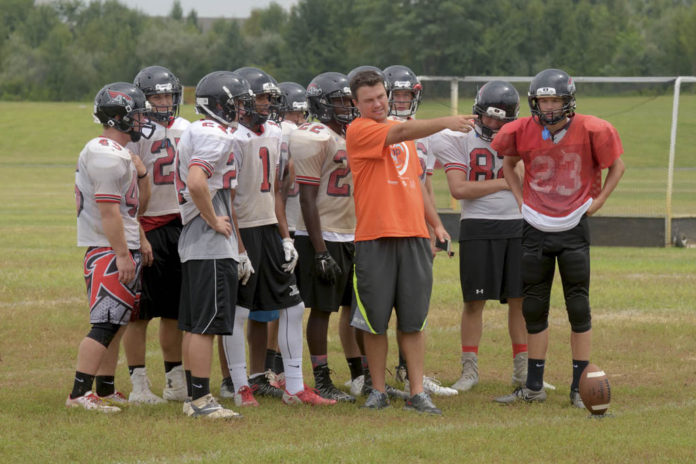
I was filled with Garden State-centric pride watching 17-year-old Union Catholic High School student Sydney McLaughlin compete in the Rio Olympics, and I thoroughly enjoy whenever one of our New Jersey scholastic athletes signs a letter of intent to compete on a larger, collegiate stage. But of course — I’m a sports fan, and have been all my life.
Yet I’m fully aware that high school athletics are entertaining — not entertainment. They aren’t primarily about state championships, earning scholarships or even running for Team USA. Those are simply wonderful side benefits, when they happen. The true reason we have athletic competition for high school students is to further extend the reach of classroom education. That’s the reason scholastic sports developed in the first place, more than a century ago, and that’s why they continue to exist.
Unfortunately, not everyone grasps this reality. It seems a small but vocal number of individuals — who represent every demographic that’s naturally connected to high school athletics — are confused. They apparently believe a 15-year-old competitor should be treated like a professional athlete, and that the local football team has the same goals and motivations as the Green Bay Packers or Notre Dame Fighting Irish.
But they don’t, and they shouldn’t. Speaking as the head of the 98-year-old, non-profit, governing body of New Jersey high school athletics — which conducts tournaments and crowns champions throughout New Jersey in 32 different sports, representing about a quarter of a million girls and boys — let me outline the multiple benefits athletic competition provides to young people.
First, training in preparation for competition and membership on a team teach a bevy of essential life lessons, many of which will be invaluable in the workplace. There’s learning to work in unison with others, following sometimes detailed directions, to earn what you desire, managing setbacks and overall adversity, and feeling a sense of community.
In addition, in an era when obesity impacts a startling one-third of the entire U.S. adult population, and nearly 20 percent of all those between 2 and 19, scholastic athletics provide an ideal way for young people to stay in shape and maintain a healthy weight. And since studies indicate that overweight teens are far more likely to struggle with weight-related issues during adulthood, any opportunity for teens to stay fit is extremely valuable.
Further, multiple studies have shown that scholastic athletes do better in the classroom than their classmates who don’t play sports. And it’s worth noting that student-athletes become much more adept than their peers at time-management, which may certainly contribute to the better grades they achieve.
And while youth-level sports often have built-in guidelines to ensure equal playing time, high school athletics teach the hard lesson that we all have different levels of ability. It can be difficult for a youngster to accept that they’ll get less playing time than a classmate based on skill, size or strength, but it’s a key lesson, since life is rarely a level playing field.
Collectively speaking, all the aforementioned benefits are my case for high school sports. And I trust you’ll agree they’re overwhelmingly convincing.
Sadly, though, some individuals fail to understand, and choose to view scoring points and winning games as the primary reason any high school has a basketball or softball or soccer team. This is more than just frustrating or annoying — it’s potentially tragic.
Excessive pressure to achieve on the playing field — and I’m referring to more than just conventional lessons about competition — can give a student-athlete more stress than they can process. In turn, this can lead to mental health issues, chronic anxiety and worse.
As for injury, all athletes are at risk — they’re an unavoidable part of physical activity. But the pressure to quickly return to the lineup can potentially lead to abuse of opioid painkillers. I’d hope that by now we all realize such abuse is a nationwide epidemic, and scholastic athletes are more at risk of problems related to managing use of painkillers than almost any other group.
The sometimes intense pressure to qualify for an athletic scholarship, which by necessity includes the need to be noticed by prominent universities, leads some student athletes to jump from high school to high school. Transfers such as these — clearly for athletic advantage — create a difficult environment for someone who, first and foremost, is supposed to be a student. My organization has specific rules governing transfers, but they’re difficult to enforce, and violations occur regularly.
Of course, winning and losing both are important components of athletic competition. But their significance isn’t rooted in cheers or trophies, but in the life lessons they teach. And it’s worth noting that competition is integral to our education system. For example, consider those trying out for the lead part in the school musical — only one person can get the part.
I’m not going to suggest that we need some major, structural change to scholastic sports in New Jersey. Far from it. I’m certain our conferences and tournaments already are among the best anywhere in the country, and our scholastic athletes benefit immensely from this.
What I do wish is to send a strict caution — to parents, coaches, school administrators and journalists — that we overemphasize scoring and winning to the detriment of all our young people. We need to ensure that our greatest concern isn’t how many goals Johnny scores, or how many wins the local varsity squad compiles, but whether or not all participants have a safe, positive experience and, in the bargain, learn something about life.
Steve Timko
Executive Director
New Jersey State Interscholastic Athletic Association

